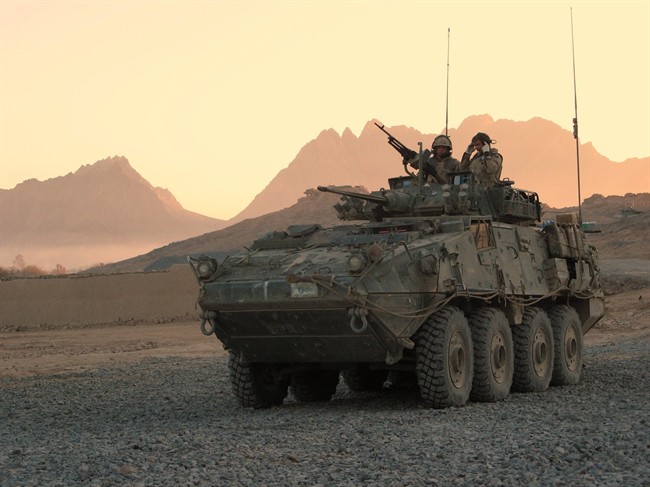Global Affairs Canada says it has found no credible evidence linking Canadian military exports or other controlled items to any human rights violations committed by the government of Saudi Arabia.

WATCH: Liberals looking for way out of Saudi arms deal, Trudeau says
“Officials did not identify any existing permits or pending applications that would be of concern under the standard robust risk assessment framework,” reads the document addressed to former foreign affairs minister Chrystia Freeland. “There is no substantial risk that current Canadian exports of military equipment or other controlled items to KSA would result in any of the negative consequences.”
The memo warned Ottawa that a moratorium on approving military exports is continuing to have a “negative impact” on trade relations with the Saudi government.
- Posters promoting ‘Steal From Loblaws Day’ are circulating. How did we get here?
- Video shows Ontario police sharing Trudeau’s location with protester, investigation launched
- Canadian food banks are on the brink: ‘This is not a sustainable situation’
- Solar eclipse eye damage: More than 160 cases reported in Ontario, Quebec
The Trudeau government had announced a review of all Canada’s existing arms sales to Saudi Arabia in the fall of 2018 after reports emerged that the Saudi government was behind the murder of journalist Jamal Khashoggi.
A spokesperson for Global Affairs said in a statement that Canada officially became a State Party to the Arms Trade Treaty (ATT) on Sept. 17 and the foreign affairs minister must deny export permits if its determined there is a “substantial risk” that the export could result in a “serious violation of human rights.”
“As we have said before, we are reviewing export permits to Saudi Arabia and no decision has been made,” Sylvain Leclerc said in an email. “While this review is on-going, no new permits have been issued.”
Controlled items such as weapons or military software cannot be exported from Canada without a permit. The moratorium on military exports did not affect Canada’s contract worth roughly $15 billion with Saudi Arabia to export Canadian-made light armoured (LAV) vehicles, manufactured in London, Ont.
READ MORE: Trudeau says Ottawa could suspend Saudi arms sale permits after Khashoggi murder
Arms control advocate Cesar Jaramillo said the memo makes a “mockery” of the Trudeau government’s rhetoric around increased transparency on arms trading.
“We reject in the strongest terms both the premises and the conclusions of this document,” Jaramillo, executive director of Project Ploughshares, told Global News. “It’s further confirmation of what we have long suspected, that this is a done deal no matter what.”
Jaramillo said it’s ironic that Canada officially became a state party to the Arms Trade Treaty, the same day the memo was published.
“Literally the day of accession, Canada laid the groundwork for continued exports to this human rights pariah,” he said.
WATCH: The first 24 hours of the Saudi-Canada tweet feud left Canadians reeling

The Trudeau government has faced criticisms on whether the vehicles are being used to commit human rights violations in the kingdom or if they are being sent to Yemen, where thousands of civilians have been killed by Saudi-led coalition airstrikes and more than 24 million people – some 80 per cent of the population – are in need of humanitarian aid.
“There are no confirmed reports of Canadian-made military equipment being deployed by KSA on Yemeni territory,” the memo reads. “This is consistent with KSA’s role within the coalition, which is primarily to lead and coordinate aerial engagements.”
Global Affairs told Ottawa that 48 export permits have been processed and are ready to go if the government lifts the moratorium.
“Those permits have been deemed ready for approval by officials and await your further consideration,” the memo reads.
READ MORE: UN calls on Canada, U.S. to hold Saudi Arabia’s Mohammed bin Salman accountable in Khashoggi killing
Following the killing and dismemberment of Khashoggi – which U.S. intelligence has said was ordered by Crown Prince Mohammed bin Salman – Prime Minister Justin Trudeau said Canada was trying to find a way out of the contract to ship military equipment to the kingdom.
“We are engaged with the export permits to try and see if there is a way of no longer exporting these vehicles to Saudi Arabia,” Trudeau said in December 2018.
The memo said that stakeholders, including Canadian businesses, civil society organizations and industry associations, are urging the Trudeau government to provide “clarity on the policy for exports” to Saudi Arabia.
“Stakeholders have argued that other measures, such as targeted sanctions, would be more appropriate in achieving a foreign policy objective,” the memo said.









Comments